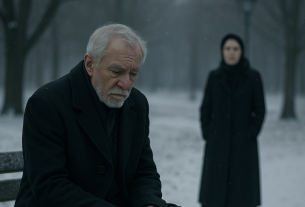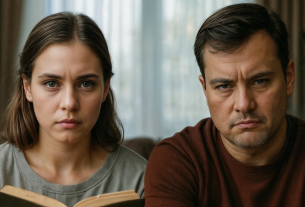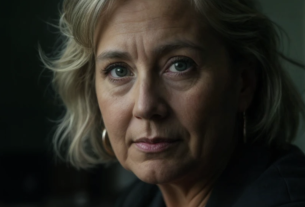A black car came to a silent stop by the massive wrought-iron gates. Beyond them began a short dead-end street of eight identical, solid houses, cut off from the rest of the world by a high brick wall.
A small, self-contained kingdom.
The security guard in a uniform jacket, bored in his glass booth, sauntered over to the tinted driver’s window.
“Who are you here to see?” he asked, already certain he knew the faces of everyone who lived or visited there.
Yekaterina Sergeyevna lowered the window.
“Myself.”
Her gaze was fixed over his head on the tiled roof of the house at the very end of the street. That one.
Thirty-two years. A lifetime. She hadn’t been here since that raw November day when Viktor Petrovich, her stepfather, personally shoved her out through these gates with one cheap suitcase.
“I don’t know you,” the guard frowned, peering at the unfamiliar, imperious face. “Give me the surname and the address of the person you’re visiting.”
“You’ll find out soon enough,” she replied evenly.
There was a dry click in the guard’s earpiece and an order that made him straighten up and step back. The gates slid open slowly, without a squeak.
The car glided down the perfectly smooth asphalt of the street of her childhood. Yekaterina was driving herself, slowly, almost savoring every meter.
There was house number three. Aunt Valya—Valentina Petrovna—her stepfather’s sister, lived there, with her perpetually dissatisfied husband and son. That day she had stood at the window, lips pressed tight, seeing her off with a look full of righteous condemnation.
House number five. Uncle Igor—Igor Petrovich—the stepfather’s younger brother. He had stood on the porch then, smoking and nodding approvingly to his elder brother, as if to say: you’re doing the right thing, this was long overdue.
Yekaterina drove on, and faces flickered through her mind like on an old strip of film. They were all here. All of his kin. Everyone had received a house from the generosity of Viktor Petrovich when, having been conveniently widowed, he became the full master of her mother’s fortune. They were his family. His clan. And she was an outsider.
She stopped by the last, largest house. Her house.
The garden was kept with fanatical care; there wasn’t a single weed on the perfectly trimmed lawn. From around the corner, leaning on a cane, appeared a gray-haired but still straight and sturdy old man. Viktor Petrovich. He was nearing eighty, but he hadn’t lost his grip.
His eyes measured the expensive car, then the woman who stepped out of it. There was something faintly familiar in her figure, in the costly cashmere coat, in the way she held her head, but he couldn’t grasp what exactly.
“Did you want something?” His voice was as imperious as it had been thirty years ago. The voice of the master.
Yekaterina took off her dark glasses. She looked straight at him, into his faded, cold eyes.
“Do you recognize me, Viktor Petrovich?”
He peered for several long seconds. His face slowly changed: from puzzlement to recognition, and then twisted into a sneering, spiteful grimace.
“Katyka? What brings you here? Come to beg for handouts? Heard I was still alive?”
She smiled. With the corner of her mouth.
“On the contrary. I’ve come to make you an offer.”
“To me?” He broke into a short, barking laugh. “You? To me? What offer could you possibly make me, you little ragamuffin?”
Yekaterina let her gaze travel over his house, then the neighbors’. She knew curious faces were already flitting in the windows. The play had begun.
“I want to buy this street. All of it. Along with your pitiful secrets that have grown into the walls of these houses.”
The old man stopped laughing. He looked at her, trying to understand whether she was joking or had finally gone mad over the years.
“Get out of here,” he hissed, tightening his grip on the cane’s knob.
“I already left once,” Yekaterina replied calmly. “I won’t leave again. My assistant will contact each of the residents in the coming days. He will contact you last.”
She got back into the car.
“Think about your price, Viktor Petrovich,” she said through the half-open window. “Although I already know it.”
The car turned soundlessly and rolled just as slowly toward the gates, leaving the old man alone in the middle of his tiny kingdom, crumbling before his eyes.
Viktor Petrovich watched her until the gates closed. The air around him seemed to thicken. Curtains in the neighbors’ windows stirred like the gills of frightened fish.
He spun around sharply and, thumping his cane, headed for house number three, where his sister Valentina lived. Her son, Oleg—a forty-year-old layabout—opened the door.
“Uncle Vitya? What was that circus? Who was the lady in that fancy car?”
“Get your mother,” snapped Viktor Petrovich, pushing him aside. “And call Igor. Now!”
Ten minutes later, an emergency family council had gathered in Valentina’s kitchen. News and photos of the car flashed along the street through messengers faster than the old man could walk home.
“She’s lost her mind,” declared Valentina Petrovna confidently, pouring valerian tea into cups. “Buy the street… Where would she get that kind of money? She slept at the train station when she left.”
“That car costs as much as three of our houses,” put in Igor Petrovich weightily, having been urgently summoned. “I know about these things. This isn’t a joke.”
Viktor Petrovich slammed his fist on the table.
“Silence! I said it! No one sells anything. No one talks to her or her people. This is my land. I gave you these houses, and I’ll take them back if anyone twitches. Is that clear?”
He swept them with a heavy gaze. They were used to obeying him. For decades. But today, for the first time, he saw not only fear in their eyes, but a greedy gleam as well.
“What secrets did she mean?” asked Veronika quietly—Igor’s daughter, a pale girl with a hunted look.
“Sick imagination!” the stepfather barked. “She was always odd. You remember. After her mother died she completely went off the rails.”
They did remember. They remembered the quiet girl who, after her mother’s death, had become a living reproach to them. Who got in the way.
The next day, exactly at ten in the morning, a business-class taxi pulled up to house number three. A young man in a perfectly tailored suit stepped out, a leather briefcase in his hand.
He walked to the door with confidence and rang the bell. Valentina herself opened it.
“Good morning, Valentina Petrovna. My name is Kirill; I’m assistant to Yekaterina Sergeyevna. Could you spare ten minutes?”
“I’m not talking to anyone!” she blurted, trying to shut the door.
Kirill gently held it with his hand.
“I strongly advise that you do. This concerns your son Oleg’s debts.”
“As far as I know, the sum has already crossed ten million, and the creditors are very impatient people. Yekaterina Sergeyevna has spent considerable time and resources gathering this information.”
Valentina froze. Her face turned ashen.
“How do you—”
“Yekaterina Sergeyevna is offering you triple the market value for your house. That will be more than enough to settle Oleg’s debts, buy both him and you an apartment in the city, and live comfortably off the interest.”
“Think it over. This isn’t just money. It’s a ticket to another life, one where you won’t start at every phone call in the night.”
He handed her a business card.
“You have twenty-four hours. If you’re the first to agree, there will be a bonus added to the amount. For courage.”
Kirill nodded politely and left. That same day he visited every house. Except for Viktor Petrovich’s.
To Uncle Igor he hinted at an upcoming tax inspection of his small business, one that would uncover a couple of very interesting schemes.
To the family in house number seven, whose son was a growing college hopeful, he offered to pay for the boy’s tuition and living expenses at any university in the world.
To each he brought not just money. He brought a solution to their biggest, most shameful problem—the kind they didn’t voice even to one another. The street buzzed like a disturbed hive.
That evening the street was unusually lively. From his window, Viktor Petrovich saw Igor arguing furiously with his wife. Heard excited voices drifting from house number seven.
But Valentina worried him most. She sat alone on the porch, smoking. Her son Oleg hovered nearby, saying something, but she seemed not to hear.
The old man felt his power—once as unshakable as the foundation of his house—begin to crumble.
Exactly one hour before the deadline, at nine in the morning, Kirill’s phone vibrated in his pocket.
“I’m listening, Valentina Petrovna.”
“I agree,” the woman’s voice was dull but firm.
“Excellent. I’ll come by now with a preliminary agreement and an advance.”
Twenty minutes later Kirill was ringing at the door of the third house again. Valentina led him to the living room, where Oleg sat on the sofa, head pulled into his shoulders. Kirill set a folder and a small case on the table.
“A letter of intent. Amount, terms. After signing—an advance. One hundred thousand dollars. Cash.”
He opened the case. Oleg swallowed. Valentina took a pen. At that moment, without knocking, Viktor Petrovich burst through the door.
“Valya, what are you thinking?!” He saw the papers, the money; his face turned purple. “I forbid it!”
Valentina slowly raised her eyes to him. There was no fear in them.
“You can’t forbid me anything anymore, Viktor Petrovich. This is my house. And my son.”
“I gave you this house!” he roared. “I took you in, sister!”
“You took us in so you’d have servants and loyal slaves,” she replied evenly. “Enough.”
She set her signature with a steady hand. Viktor Petrovich understood he had lost.
“You’ll regret this,” he hissed. “All of you will crawl back to me when she throws you out on the street—just like once you begged me to throw her out!”
He slammed the door. Kirill handed the case to Valentina.
“Yekaterina Sergeyevna asked me to tell you that you may remain in the house until you find new lodgings.”
When he stepped outside, Igor Petrovich was already waiting for him.
“I want to talk too,” he said, glancing around nervously. “What guarantees…?”
“Full guarantees,” Kirill replied. “Yekaterina Sergeyevna solves problems. She doesn’t create them.”
The first stone had been removed. The dam began to collapse. By evening that same day, three more had given in. The domino effect was under way.
Yekaterina watched it from the picture window of her suite.
“They’re breaking even faster than we expected,” Kirill said, entering the room.
“They’re not breaking. They’re simply showing their true price,” Yekaterina shook her head. “They’re afraid of losing what he gave them. These houses are their cages. Beautiful, comfortable—but cages.”
“And what about the main house?” Kirill asked. “The one that still shows in the paperwork as belonging to your mother.”
“And that, Kirill, is the main secret of this street,” Yekaterina turned to him. “He didn’t just throw me out. He forged my mother’s will. Back then I couldn’t prove it.”
“This house, this land—they were all meant to go to me. He knew it. And they all knew it. There was an old notary, a friend of my mother’s.”
“He wouldn’t take part in the fraud, but my stepfather threatened his family. The notary left town, but before that he managed to make and notarize a copy of the true will.”
“He found me only ten years ago, before his death, and gave me everything. Said it was his debt to my mother’s memory.”
Kirill let out a low whistle.
“So that’s why they were so quick to side with throwing you out. They were accomplices.”
“Exactly. Their silence was the price of my exile. And now I’ve come to take back what’s mine—with interest.”
On the third day, Viktor Petrovich realized he was alone. His empire had fallen. The doorbell rang. He knew who it was. Kirill stood on the threshold.
“Viktor Petrovich,” he said politely. “Now we can speak with you as well.”
“I’ve nothing to say to you,” the old man croaked.
“I’m afraid that’s no longer up to you,” Kirill replied calmly, holding out a folder. “Yekaterina Sergeyevna isn’t making you an offer. She’s informing you.”
With a trembling hand, Viktor Petrovich took the papers. On the first page was a copy of the will. The real one.
“There are two options,” Kirill continued. “First: you move out within a week. Quietly. In return, Yekaterina Sergeyevna doesn’t pursue the fraud case. You simply disappear.”
He paused.
“The second option: you refuse. And then, right now, I call the police. And you spend what remains of your days giving testimony. The choice is yours.”
Epilogue
A week later, early in the morning, an old taxi pulled up to the settlement’s gates. From the house at the end of the street came Viktor Petrovich.
He was alone. With a small cardboard suitcase in his hand. He didn’t look back. The new guard opened the gate in silence.
The car disappeared around the bend. The era of Viktor Petrovich ended not with a thunderclap, but with a pitiful, barely audible creak.
Six months passed. The street changed. In the houses Yekaterina had bought, her people moved in. Not relatives by blood, but those she considered her real family.
The doctor who had once saved her. The old professor who became her mentor. The young family of her best partner. People proven not by feasts, but by hardships.
On one warm autumn day, for the first time in thirty-two years, Yekaterina entered her house as its mistress.
She walked slowly through the rooms. Here was the piano her mother had taught her to play. Here the armchair where her father read her fairy tales. In the living room, her mother’s portrait hung on the wall. Yekaterina stepped up and ran her hand over the canvas.
“I’m home, Mama,” she said softly. There was no pain or triumph in the words. Only a statement of fact.
She went out into the garden. The old apple tree they had planted with her father still stood in its place. Yekaterina sat on the bench beneath it. From the neighboring plots came voices, laughter, the sounds of life.
Kirill approached with two cups of herbal tea.
“Everything is settled, Yekaterina Sergeyevna. The street is entirely yours.”
“Thank you, Kirill.”
“You’ve achieved everything you wanted,” he said. “You’ve won.”
“I wasn’t at war,” she replied calmly. “People wage war for someone else’s. I simply took back what was mine.”
“For thirty years I built myself, brick by brick, on the ruins they threw me into. And then I just built a house out of those bricks.”
“Here. Victory isn’t when you destroy your enemy’s world. It’s when you build your own world on cleared ground.”
She looked at the houses, at the lights in their windows, at the people who had become her new family. She hadn’t just bought the street.
She had bought back her past to build her future. And that future was only beginning.



